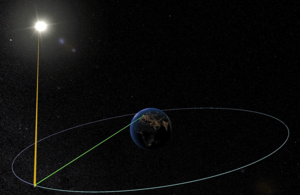Global S&T Development Trend Analysis Platform of Resources and Environment
| UK government commissions space solar power stations research | |
| admin | |
| 2020-11-14 | |
| 发布年 | 2020 |
| 语种 | 英语 |
| 国家 | 英国 |
| 领域 | 气候变化 ; 资源环境 |
| 正文(英文) |
Press release
UK government commissions space solar power stations researchSolar energy harvested in space offers the potential for an unlimited and constant zero carbon power source 
Artist's impression of how a space-based solar power station might work. © Frazer-Nash Consultancy The UK government has commissioned new research into space-based solar power (SBSP) systems that would use very large solar power satellites to collect solar energy, convert it into high-frequency radio waves, and safely beam it back to ground-based receivers connected to the electrical power grid. It is an idea first conjured by science-fiction writer Isaac Asimov in 1941, and is now being studied by several nations because the lightweight solar panels and wireless power transmission technology is advancing rapidly. This, together with lower cost commercial space launch, may make the concept of solar power satellites more feasible and economically viable. Now the UK in 2020 will explore whether this renewable technology could offer a resilient, safe and sustainable energy source. The study, led by Frazer-Nash Consultancy, will consider the engineering and economics of such a system – whether it could deliver affordable energy for consumers, and the engineering and technology that would be required to build it. One of the biggest issues to overcome is assembling the massive satellites in orbit, which has not been done before at this scale. Dr Graham Turnock, Chief Executive of the UK Space Agency, said:
Historically, the cost of rocket launches and the weight that would be required for a project of this scale made the idea of space-based solar power unfeasible. But the emergence of privately-led space ventures has brought the cost of launch down dramatically in the last decade. Martin Soltau, Space Business Manager at Frazer-Nash outlined what the study will involve:
As the effects of climate change become more pronounced, prominent research institutions and government agencies are focusing new money and attention on novel approaches to reduce global warming. In 2019, Britain passed an important milestone, with more electricity generated from sources like wind, solar and nuclear power, that produce almost no carbon dioxide emissions, than from carbon-emitting fuels like natural gas and coal. According to the World Resources Institute – a Washington-based non-profit that tracks climate change – Britain has reduced carbon dioxide generated in the country by about 40 per cent, which is more than any other major industrialised country. As the National Space Council sets a new direction for our space policy, the UK Space Agency is committed to understanding the future opportunities space technologies open up.
Published 14 November 2020
|
| URL | 查看原文 |
| 来源平台 | Department for Business, Energy & Industrial Strategy |
| 文献类型 | 新闻 |
| 条目标识符 | http://119.78.100.173/C666/handle/2XK7JSWQ/302953 |
| 专题 | 气候变化 资源环境科学 |
| 推荐引用方式 GB/T 7714 | admin. UK government commissions space solar power stations research. 2020. |
| 条目包含的文件 | 条目无相关文件。 | |||||
| 个性服务 |
| 推荐该条目 |
| 保存到收藏夹 |
| 查看访问统计 |
| 导出为Endnote文件 |
| 谷歌学术 |
| 谷歌学术中相似的文章 |
| [admin]的文章 |
| 百度学术 |
| 百度学术中相似的文章 |
| [admin]的文章 |
| 必应学术 |
| 必应学术中相似的文章 |
| [admin]的文章 |
| 相关权益政策 |
| 暂无数据 |
| 收藏/分享 |
除非特别说明,本系统中所有内容都受版权保护,并保留所有权利。
修改评论